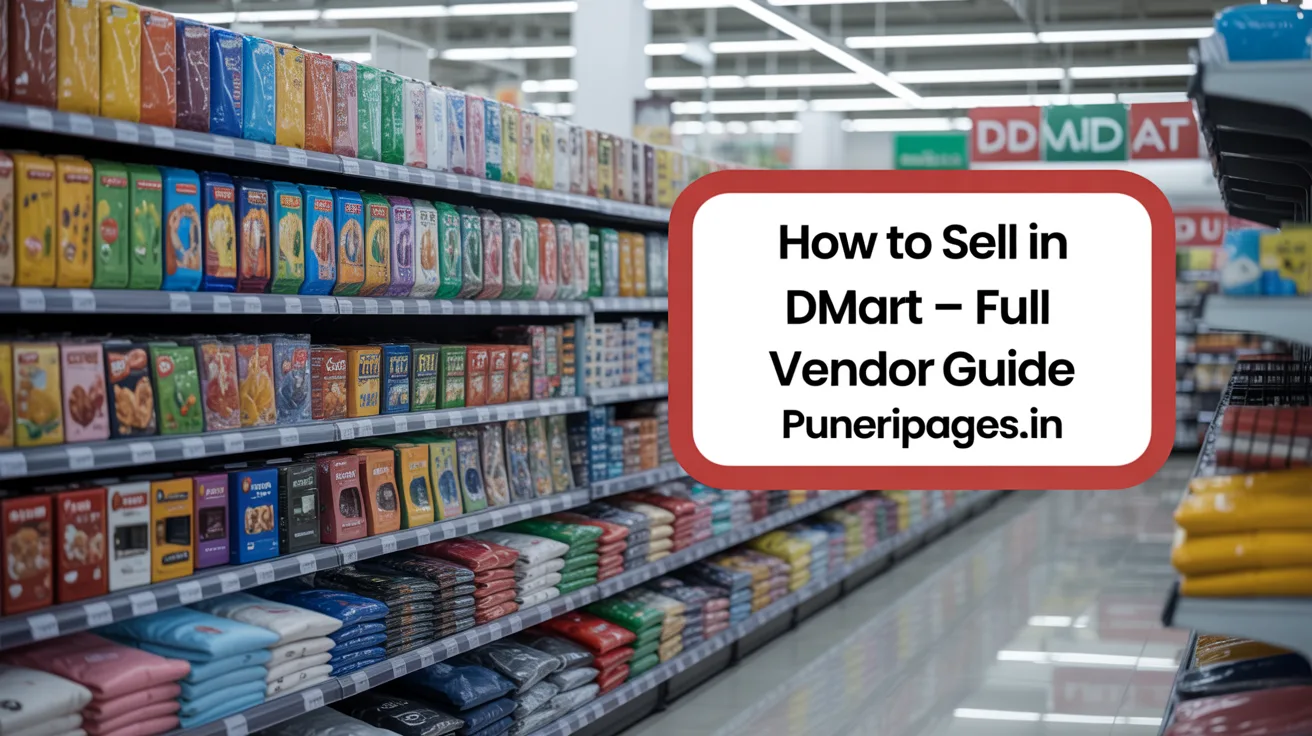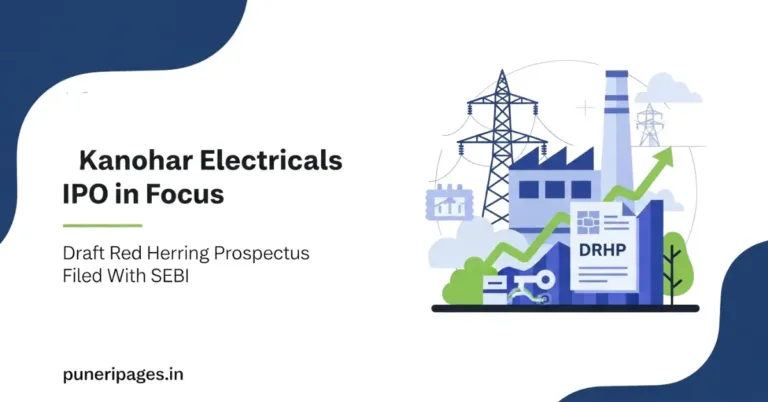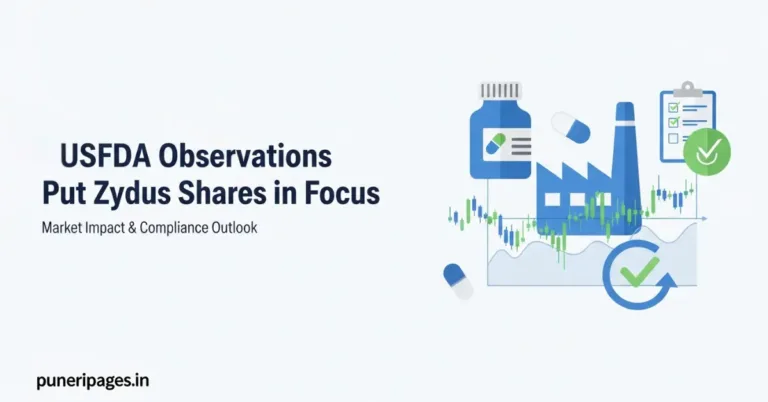
Want to get your products into DMart? Learn the full process here.
Introduction to DMart’s Retail Model
DMart (Avenue Supermarts Ltd.) is a Mumbai-based hypermarket chain founded by Radhakishan Damani in 2002. It focuses on an “everyday low cost, everyday low price” strategy – offering basic groceries, household items, apparel and more at tight margins. Over two decades DMart has grown explosively (over 415 stores in 12+ states/UTs as of 2025). The chain’s core categories include grocery and staples, daily essentials, home and personal care, dairy, fruits & vegetables, kitchenware, apparel (men’s, women’s, kids’) and other general merchandise. This high-volume, value-driven model makes DMart an attractive outlet for suppliers: listing there can give a brand access to millions of budget-conscious customers across India. Suppliers want to be listed at DMart to tap its large network, bulk-purchasing power and reputational credibility.
Table of Contents

How to Apply and Onboard as a DMart Vendor
Suppliers interested in DMart usually follow these steps:
- Determine Product Fit: Make sure your product aligns with DMart’s assortments (e.g. FMCG, packaged foods, home goods, apparel, electronics, etc.). Products must meet DMart’s quality standards and categories.
- Prepare Legal & Business Documents: Ensure your business is properly registered (e.g. sole proprietorship, partnership or company) and has mandatory licenses: GST registration, PAN, and any product-specific certifications (see next section).
- Complete Supplier Inquiry: Visit DMart’s official site or procurement office. DMart’s website has a “Partner With Us” or “New Suppliers” section with an online vendor registration form. Suppliers fill in company profile, product details, pricing info and attach samples as requested. Alternatively, DMart invites walk-in vendor inquiries at its Thane/Mumbai offices.
- Submit Company Profile and Samples: When contacting DMart, provide a concise company profile, product catalog, marketing collateral and sample products. Be ready to discuss pricing and supply capacity. (Franchise guides advise emphasizing any unique selling points of your products.)
- Wait for Evaluation: Once submitted, DMart’s buying team will review your offer. If interested, they may request formal meetings, trials or additional testing. Approval timelines vary (often 1–3 months), during which you may be asked to clarify details, adjust pricing or supply larger samples.
Example Step-by-Step Process (from guides)
- Gather Documents: GST certificate, PAN card, FSSAI license (for food products), BIS/ISI certificates (for electronics or certain goods), and optional MSME registration.
- Bulk Supply Planning: Ensure you can produce sufficient volumes at competitive prices. DMart emphasizes bulk procurement to negotiate low costs.
- Contact DMart Procurement: Reach out via DMart’s official portal or email (e.g. [email protected]) to express interest. Provide basic company info.
- Fill Online Form: On DMart’s website find the “Supplier Registration” or “Vendor Inquiry” form. Submit your company’s KYC details, product list, and price quotes.
- Follow Up & Sample Review: After submission, DMart may contact you for more information, factory visits or product trials. Highlight what makes your product stand out in quality or pricing.
- Finalize Onboarding: If approved, you’ll enter into a vendor agreement. DMart may assign you to supply particular product lines and will issue purchase orders.
Legal Requirements and Certifications
To sell to DMart, your business and products must comply with Indian laws and DMart’s internal policies:
- Company Registration: You need a valid business entity (e.g. private limited company, partnership or proprietorship) registered in India. This is a prerequisite for GST registration and contractual agreements.
- GST Registration: Any supplier must be GST-registered. DMart requires a GSTIN to process invoices and payments. This ensures compliance with tax rules.
- PAN Card: The business PAN (Permanent Account Number) is required for official filings and contracts.
- FSSAI License (Food Products): All packaged food items must have an FSSAI license and FSSAI number printed on the package. DMart will not accept unlabeled or unlicensed food products.
- BIS/ISI Certification (Electronics/Others): Many electronics/appliances require a BIS (Bureau of Indian Standards) or ISI mark to be legally sold in India. If you supply items like chargers, cables, appliances or cookware with standards, obtain the requisite certification.
- MSME Registration (Optional): Registering as an MSME (Udyam) is not mandatory but can be beneficial. It can streamline some compliance and may prioritize your interest as a small business, but DMart’s main concern is quality and volume capacity.
(DMart will verify all these documents during onboarding. Incomplete or invalid licenses will delay or prevent approval.)
Documentation and Verification
Prepare the following documentation for verification by DMart’s team:
- Company Profile: Brief overview of your business, ownership structure, years in operation and production capacity. Include GST certificate, PAN and other registration papers.
- Bank Details: A copy of a bank statement or canceled cheque in the company’s name, so DMart can set up payments.
- Quality Certificates: Though not always mandatory, provide ISO/QMS certifications or product lab test reports (e.g. BIS test reports, nutritional analysis, CE/fcc if any). This builds confidence in quality.
- Product Information: For each SKU, have ready the product specifications, shelf life, formulation, size/weight, packaging details, etc. DMart will want to know MRP, net weight, ingredients (if food), material (if garment), etc.
- Samples: High-quality product samples are usually required. DMart’s buyers may test food for taste/safety, apparel for fabric quality, etc. Ensure samples are production-standard and labeled with MRP, manufacture date, expiry/best-before date (for food) and company address.
- Pricing Details: Clearly state your unit prices. DMart will look for “everyday low price” offers, so ensure your quoted prices align with wholesale volume discounts. Include trade margins vs. your MSP (maximum selling price).
According to industry guides, when submitting your supplier inquiry form you’ll attach your company profile, product samples and pricing. DMart’s procurement team may further verify your factory, quality processes and delivery capabilities (e.g. via site visits or audits) before final approval.
Category-Specific Considerations
DMart stocks diverse categories, each with its own requirements:
- FMCG & Packaged Foods:
- Shelf Life: Food items must have a long remaining shelf life at delivery. FSSAI guidelines (applied even to offline retailers) suggest at least 30% of total shelf life (or a minimum of 45 days) remaining upon delivery. For example, a 10-day butter packet needs ≥3 days left.
- Labeling: All pre-packaged foods must display required FSSAI labels – product name, ingredient list, net weight, manufacturer/packer address, batch/lot number, manufacturing & “best before” or expiry dates, and the FSSAI license number. Vegetarian/Non-vegetarian symbols are also mandatory.
- Packaging: Food packaging should be tamper-proof, moisture-proof and sturdy for storage. DMart will only stock retail-ready packs with printed MRP (including taxes) on each unit. Bulk packaging (crates/pallets) must also be hygienic for perishables like dairy.
- Personal Care & Household Consumables:
- Products like soaps, detergents, cleaning agents or toiletries must comply with relevant standards (e.g. ISI/ISI-type for items like water filters or pressure cookers if applicable). Packaging must clearly show MRP, manufacturer details and any statutory marks (like ISI for pressure cookers). Barcoded labels (EAN/UPC) for scanning at checkout are highly recommended.
- Products like soaps, detergents, cleaning agents or toiletries must comply with relevant standards (e.g. ISI/ISI-type for items like water filters or pressure cookers if applicable). Packaging must clearly show MRP, manufacturer details and any statutory marks (like ISI for pressure cookers). Barcoded labels (EAN/UPC) for scanning at checkout are highly recommended.
- Apparel & Footwear:
- Labeling: While clothing isn’t regulated like food, good retail practice is to include tags with size, fabric composition, washing instructions, country of origin and MRP. Some international/quality-conscious buyers expect a care-label per Bureau of Indian Standards guidelines (TR-347 for care labels).
- Presentation: DMart sells clothing under various brands. Ensure garments are neatly folded or hung and shrink-wrapped if possible. Private-label clothing must meet DMart’s standards for stitching and fabric quality.
- Packaging: Inner polybags and size banding for packs (if multi-piece) help with inventory handling. All cartons should be clearly labeled with style, color, size, quantity and barcode.
- Electronics & Appliances:
- Certifications: Almost all electrical/electronic products (adapters, chargers, cables, lights, appliances, etc.) must bear the BIS Standard Mark for India. Products like LED bulbs, appliances should have the Bureau of Energy Efficiency (BEE) star label if required by law.
- Warranty & Service: DMart will expect at least a standard manufacturer’s warranty on electronics. Supply should include warranty cards and service center details. DMart customers demand clear after-sales service.
- Safety: All products should meet relevant safety standards (e.g. ISI 694 for cables, ISI 303 for plugs, etc.). Low-quality electricals can be rejected.
- Packaging: Electronics should be boxed securely (EPS foam, bubble wrap) to prevent damage in transit and on shelves. Box labels must show model number, specifications, barcode and MRP.
- Home Goods & Kitchenware:
- Products like plastic containers, cookware, glassware or small home appliances should be consumer-ready. While no special license is needed for most, ensure materials are food-grade (for utensils) or safe (e.g. toys should be non-toxic). Label each item with MRP and manufacturer details.
- Fragile items must be double-boxed or padded to withstand handling.
- Private Label Brands:
- Note: DMart has in-house brands. If you manufacture for a DMart brand, you will work closely with DMart’s development teams, who will set strict quality and packaging guidelines (similar to above) and often require competitive co-packed pricing.
(In all cases, DMart expects suppliers to strictly follow India’s labeling rules. For food this includes ingredient lists and dates; for all packaged goods the MRP and net quantity must be clearly printed on the packaging. Generic barcodes (EAN/UPC) for automated checkout are industry-standard.)
How DMart Evaluates New Vendors
DMart’s procurement team evaluates potential suppliers on several key factors:
- Pricing & Margins: DMart is famous for razor-thin retail margins. They expect suppliers to offer products at the lowest possible prices. Vendors must allow DMart to negotiate aggressively. Industry sources note that DMart’s typical markup is very low (for example, ~4–8% on groceries, ~5–10% on electronics, ~15–20% on home goods, whereas apparel/footwear margins are higher at ~20–30%). In practice, DMart seeks high volumes with very tight supplier margins, so only vendors who can sustain low unit prices succeed.
- Product Quality: Excellent quality and consistency are mandatory. DMart will reject products that don’t meet its standards. New vendors often must submit samples for testing (taste tests for food, durability tests for goods). Passing DMart’s QA checks is crucial.
- Supply Capacity & Reliability: DMart orders in bulk and replenishes frequently. Vendors must demonstrate the capacity for large, consistent supply. DMart values stable throughput, on-time delivery and ability to scale. Suppliers are often evaluated on their batch sizes, lead times and logistics readiness. DMart may even audit production capacity.
- Value-Added Factors: Unique products, innovative packaging, or private-label capabilities can be a plus. As one guide advises: emphasize how your product differs in quality, pricing or uniqueness. DMart likes exclusives (within a category) and will reward suppliers who help them differentiate.
- Business Practices: Timely payment cycles, transparent contracts and good record-keeping are part of DMart’s expectations. They will review your compliance record (e.g. any past issues with food safety or regulation). Strong business references can strengthen a vendor’s case.
In summary, DMart looks for vendors who combine low-cost supply with solid quality. As one source says, requirements include “competitive pricing models” and “capacity for a large and consistent supply”franchiseindia.com. Vendors should be prepared for tough negotiations and possibly longer payment terms; the benefit is access to DMart’s high-volume orders.
Contacting DMart’s Procurement Team
To initiate the process or inquire further, suppliers should use official channels:
- Online Portal: Start by visiting DMart’s official website. The “Partner With Us” (or “New Suppliers”) page (e.g. dmartindia.com/partner-with-us) provides information and may have an online enquiry form. This is often the fastest way to get your details into their system.
- Corporate Office Visits: DMart’s corporate offices in Maharashtra handle vendor inquiries. The Thane (Wagle Estate) office is well-known to handle supplier meetings:Avenue Supermarts Ltd., Plot B-72/72A, Road No.33, MIDC, Wagle Estate, Thane (W), Maharashtra – 400604.
- Mumbai Office (Powai): The Head Office in Powai (Mumbai) can also be contacted for procurement matters:Anjaneya CHS Ltd., Opp. Hiranandani Foundation School, Orchard Avenue, Powai, Mumbai – 400076. Tel: +91-22-33400500. Email: [email protected].
- Direct Outreach: If you know a contact or buyer at DMart (through industry networking, trade fairs etc.), reaching out directly with a concise supplier introduction can help. Always follow up formal introductions with emails or portal submissions as above.
- Buyer Meetings/Events: DMart occasionally organizes vendor meets or “buyer-seller” meets at trade shows (especially for FMCG). Keep an eye on industry bulletins or DMart announcements for such events.
When approaching, be professional and persistent. Always reference the formal vendor registration rather than informal cold-calling. Ensure you meet DMart’s working hours and dress code when visiting their offices (business attire), and come prepared with all necessary copies of documents and product samples.
Packaging, Labeling and Compliance Standards
DMart expects suppliers to follow strict packaging and labeling norms so goods can be stored, shipped and shelved without issues:
- MRP and Barcodes: Every packaged product must show the Maximum Retail Price (MRP) (inclusive of all taxes) printed on the packaging. Vendors typically affix an MRP sticker or have it pre-printed. An accompanying barcode (EAN/UPC) or QR code is standard for point-of-sale scanning. This aids quick checkout and inventory management.
- Product Information: Consumer-facing information must appear in English or Hindi (or both). Required details include brand/product name, net quantity (in metric units), manufacturer/packer name and address, batch or lot number, manufacturing date and expiry/“best before” date. For imported goods, country of origin is also needed.
- Regulatory Labels: As noted, FSSAI license number (for foods) and ISI/BIS marks (where applicable) should be printed clearly. Vegetarian/Non-vegetarian symbols (green or brown dot) must be on all food packaging. Any legally required cautionary or usage labels (e.g. flammability for aerosols, choking hazard for small parts) must be present.
- Language and Legibility: All text must be clear, indelible and in a legible font size. Labels on food must not be misleading or false, per FSSAI norms.
- Packaging Quality: Outer cartons should protect products during transport. Use durable corrugated boxes or cases; staple or tape them securely. Avoid damage in pallets or from forklift handling. For retail boxes (especially electronics or crockery), use sufficient padding. All cartons sent to DMart DCs/stores should be labeled on the outside with contents and handling marks.
- Language: Although English is preferred, including Hindi can be beneficial for certain regions. Rural or vernacular language claims should not contradict English labeling.
- Compliance Testing: DMart may perform random quality tests. It’s best to have products tested by accredited labs (e.g. FSSAI-approved labs for food). Keep test certificates handy in case DMart requests them.
In sum, treat DMart like any large retailer with respect to labeling laws. For food products, compliance is particularly critical – all mandatory label fields (ingredients, net weight, manufacturer info, etc.) must be present. Ensure no product reaches DMart shelves without correct MRP, dates and license marks. This compliance avoids legal issues and streamlines acceptance at DMart’s distribution centers.
Distribution, Warehousing and Logistics
DMart’s supply chain is highly centralized and efficient. Key points vendors should know:
- Centralized Warehouses: DMart operates large regional warehouses (distribution centers) that receive goods and then dispatch them to stores. Goods are typically delivered in bulk to these hubs rather than to individual stores. DMart’s model of centralized warehousing reduces transportation costs and ensures uniform stock levels. As a vendor, you will most likely ship pallets or truckloads to a DMart DC according to their schedule.
- Logistics Partnerships: While DMart has its own logistics arm, it also relies on third-party logistics (3PL) providers. In practice, DMart coordinates inbound freight through contracted transporters. Vendors should clarify whether to use DMart’s nominated carriers or arrange pickup themselves. Often, for large contracts, DMart will issue freight instructions.
- Delivery Scheduling: After onboarding, DMart’s purchase order will include delivery timelines. You must adhere strictly to those schedules. Late or partial shipments can strain the relationship. If possible, offer flexible weekly delivery slots (e.g. 2–3 times a week) to ensure steady replenishment.
- Warehousing Standards: When shipping, pack goods on pallets or crates that meet quality standards. Keep pallets uniform (80×120 cm or DMart’s preferred size) and wrapped/stable. Label each pallet with a packing list. DMart warehouses expect easy forklift access, so don’t double-stack beyond safe limits.
- Cold Chain (if applicable): For perishables like dairy, frozen or chilled goods, coordinate cold chain logistics. Ensure temperature is maintained until delivery. DMart’s cold storage facilities are limited, so work with cold carriers and deliver on time.
- Inventory Coordination: DMart may use Vendor Managed Inventory (VMI) practices for big suppliers. Be prepared to track inventory levels. Accurate EDI (Electronic Data Interchange) or online invoicing systems may be introduced later for order management.
Overall, DMart’s logistics focus on bulk efficiency. Bulk-supply vendors typically deliver directly to DMart’s distribution centers, which then distribute to overlying stores. As a supplier, you should be ready to manage bulk shipments and possibly partner with a reliable 3PL. This centralized distribution approach means consistent delivery quality is as important as product quality.
Digital Onboarding and Online Portals
DMart’s digital tools for new suppliers are limited (unlike some modern e-commerce giants), but the following should be noted:
- Online Vendor Registration: DMart’s official website hosts the supplier registration form. Suppliers should register through the DMart “Partner With Us” page (linked here for convenience). This is the primary digital gateway for new vendor inquiries. Fill this form completely to create an entry in DMart’s vendor database.
- E-mail Communication: Post-registration, most follow-up is via email and phone calls. Maintain a dedicated point-of-contact email and number that DMart can reach. Ensure prompt replies to DMart’s queries to speed up onboarding.
- Enterprise Portals: Larger suppliers (once approved) may gain access to DMart’s internal vendor portal or EDI systems for order and invoice management. However, initial onboarding does not require any special portal beyond filling forms and sending documents.
- Government Single Window: While DMart doesn’t publicly use government portals like NSWS for vendor registration, you should ensure compliance on all government fronts (e.g. Udyam registration for MSME, compliance with Food Safety Display Regulations, etc.) to facilitate any part of the process if asked.
- Stay Updated: DMart’s policies can evolve. Regularly check official DMart channels (website announcements) or DMart’s LinkedIn page for any new digital initiatives for vendors.
(Note: At present, DMart does not have a public “DMart seller” program like some marketplaces. All engagement is done through the official corporate channels.)
Tips to Increase Your Approval Chances
To stand out as a DMart vendor, consider these practical tips:
- Competitive Pricing: Do your market research and offer prices that allow DMart its low-retail-margin strategy. If possible, quote introductory bulk discounts. Demonstrating willingness to negotiate can impress buyers.
- Highlight Uniqueness: Emphasize how your product is better or different (e.g. superior quality, organic ingredients, unique design). A “Pro Tip” noted by industry advisors is to clearly articulate any USP in your pitch.
- Complete Documentation: Submit all required documents in one go. Missing licenses or certificates will delay the process. Use a clear checklist (as above) before you apply.
- Sample Quality: Ensure that sample products sent to DMart are exactly as they would be shipped at scale. Avoid sending sub-standard “display samples” that can hurt confidence.
- Professional Presentation: When meeting buyers, present a polished company brochure or slide deck. Dress professionally. Bring clean product samples and packaging mock-ups. First impressions count.
- Leverage MSME Benefits: If you’re a registered MSME, mention it. You may avail MSME concession on certain fees or government schemes, and DMart may give minor preference to MSMEs in unbranded product categories.
- Be Patient and Follow Up: After your initial application, politely follow up after a few weeks. DMart processes can be slow due to volume. A timely reminder email asking if they need more info can keep your application on their radar.
- Quality Assurance: If you can obtain third-party certifications (ISO 9001, FPO for oil, AGMARK for spices, etc.), showcase them. They indicate professionalism.
- Local Reference: If you supply successfully to other retailers (Reliance, Big Bazaar, etc.), mention that experience. Demonstrated retail exposure can build trust.
By thoroughly preparing and aligning your offering with DMart’s low-cost, high-volume model, you greatly increase the likelihood of approval. Remember that DMart values long-term partnerships, so demonstrating reliability and professionalism from the start is key.
Challenges and How to Address Them
Be aware of common challenges vendors face with large chains like DMart and strategies to mitigate them:
- Heavy Price Pressure: DMart’s low-margin model means suppliers often have very thin profit per unit. This can strain small businesses. Solution: Optimize your costs (e.g. through economies of scale, lean manufacturing) and offer multi-year contracts to lock in volume; this may give you negotiating room.
- Large Volume Requirements: New vendors may be asked to supply hundreds of cartons per order. This is tough if you’re a small-scale maker. Solution: Plan capacity carefully. Consider partnering with contract manufacturers or co-packers to scale up quickly. If you can’t supply nationally from day one, discuss starting regionally (some vendors pilot in one state before full roll-out).
- Stringent Quality Checks: Any product defect can lead to returns or order cancellations. Solution: Implement strong QA controls. Perform your own product testing and maintain strict quality tolerance. Keep buffer stock in case inspections require reshipments.
- Payment Terms: Large retailers often pay on extended credit (30–90 days). This can hurt cash flow. Solution: Negotiate reasonable payment terms up front. Explore invoice discounting or factoring if needed. Present a solid credit profile (bank statements) to assure DMart of your stability.
- Regulatory Compliance: If you slip up on labeling rules or food safety, DMart can reject entire shipments. Solution: Stay updated on regulations. Even if laws change, proactively update your packaging. Consider hiring a compliance consultant for critical products (especially foods).
- Competition from Private Labels: DMart sells its own brands (e.g. Best Choice, D-Fresh). These often compete directly with vendor brands at lower prices. Solution: Differentiate your brand or product quality. If possible, propose a private-label arrangement where you manufacture for DMart’s brand on agreed terms.
- Logistical Coordination: Delivering to DMart’s warehouses on schedule takes coordination. Solution: Work closely with DMart’s logistics team. Use tracking tools and confirm all shipping documents. If DMart provides an EDI or ASN system, ensure you can interface.
By anticipating these challenges and preparing accordingly, vendors can navigate the DMart onboarding more smoothly. Remember that many successful DMart suppliers began with similar hurdles but overcame them through planning and adaptability.
Contact Links and References
- DMart Supplier Registration: DMart Partner With Us Page (official vendor signup form).
- Corporate Contacts: Avenue Supermarts Ltd. (DMart) – Wagle Estate, Thane (W), Maharashtra – 400604; Powai, Mumbai – 400076 (Tel: +91-22-33400500; Email: [email protected]).
- Relevant Guidelines:
- FSSAI Labeling Regulations for packaged foods.
- BIS Compulsory Certification lists (see BIS website).
- MSME Registration details (Udyam portal).
Aspiring vendors should leverage these resources and follow the structured process above. While there are no widely published vendor case-studies for DMart, industry feedback suggests that small manufacturers who meet DMart’s standards often see a rapid increase in volume and market exposure. With careful preparation – strong documentation, compliance and competitive pricing – your products can find a place on DMart’s shelves.
Sources: Official and trusted industry sources on DMart’s procurement processes and Indian retail regulations
Citations
–Download PDF
–DMart – Wikipedia
–DMart Vendor Registration – IndiaFilings
–DMart Franchise: Cost, Profit, and Requirement in India
–DMart Vendor Registration – IndiaFilings
–DMart Franchise: Cost, Profit, and Requirement in India
–Creating Business Success: A Deep Dive into DMART Model






